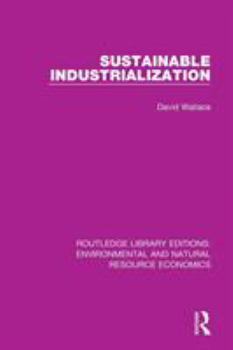Sustainable Industrialization
This report, first published in 1996, argues that radical changes in industrial organization and its relationship to society tend to arise in rapidly industrializing countries, and that new principles of sustainable production are more likely to bear fruit in developing than in developed countries. The rising tide of investment by multinational firms - who bring managerial, organizational and technological expertise - is a major resource for achieving...
Format:Paperback
Language:English
ISBN:1138503347
ISBN13:9781138503342
Release Date:April 2019
Publisher:Routledge
Length:108 Pages
Weight:0.36 lbs.
Dimensions:0.2" x 6.1" x 9.2"
Customer Reviews
2 ratings
The Wallace thesis - what is it and how can it be applied?
Published by Thriftbooks.com User , 21 years ago
Where will the first fully fledged green economy be? Germany? Holland? Sweden? Some other advanced developed country? Not according to David Wallace, author of "Sustainable Industrialisation". The lesson of history seems to be that paradigm breaking new modes of production, while growing out of elements of the previous system, take root and flourish first, as integrated systems, in newly developing or redeveloping economies. For example it was the US and not the leading industrial power of the day, the UK, that pioneered manufacturing based on interchangeable parts and, eventually, mass production. Lean production emerged, not in the US, but in Japan, an economy rebuilding after the devastation of war. But why should leaders lose the lead? This is most likely to occur when a new approach to production cannot evolve easily or quickly from hundreds of independent innovations but requires a major synchronised shift in the psychological or physical structure of industry. In the established industrial powers, vested interests in the old paradigm work hard to slow the pace of change, individual investments in the new paradigm are too risky because they are not synchronised with other complementary investments. Mind sets that are vital to the new paradigm are considered to be radical, untested and threatening, so they find it hard to make it into the mainstream. So it may well be that countries that are just starting the process of industrialisation, or regions whose industries have become obsolete or have been destroyed, may be the ones to take on the new approaches. There is no doubt that a green economy built from the ground up using closed-cycle, industrial ecology and dematerialisation principles and based on the use of recycled and renewable resources would be far more cost competitive than the marginally greened economies that we see now in the leading-edge countries. But is the cost-competitiveness of an ultra-green economy going to be great enough to encourage newly emerging and newly rebuilding economies to take the risk of striking out into unchartered industrial waters? Wallace seems to believe it will be. I am not so sure. For example, while the revolutionary Lovins hypercar can deliver the same service level for between 75-90% less energy than conventional cars, its sale price will be similar. So while society will benefit massively from this car and the consumer will not lose, the producers are unlikely to gain major competitive leverage simply from reductions in the cost of production. But all is not lost by any means. I think that the Wallace thesis is basically sound. It is just that, for this particular industrial paradigm shift, the critical economic driver for the establishment of greenfields green economies will be quality rather than cost-based competitiveness. A credible scenario might be as follows. A number of (multi-national?) consumer products manufacturers come to the conclusion that they can gain a decisive comp
How business and Third World activists can save the planet
Published by Thriftbooks.com User , 21 years ago
This is a book of great significance. Wallace makes a convincing case that developments in the Third World are key to the resolution of global environmental problems. He argues that sustainable patterns of production and consumption are unlikely to be adopted on a sufficiently large scale in the already-industrialized world of North America, North West Europe and Japan. The economic, social and political changes required present too large a challenge for established ways of life. A large, newly-industrializing country, however, could pioneer a new, sustainable, pattern of industrial production, which could then be adopted more widely. Wallace makes an argument, which many will find counterintuitive, that multinational corporations could play a major role in this process. Sustainable forms of industrialization will need innovative technologies and substantial investment capital, both of which are commanded by large corporations. Wallace suggests that a Third World government, pressured by an effective environmental movement, could establish guidelines which steer commercial forces toward sustainable production. Large corporations could be persuaded to comply with these guidelines by their desire to gain access to the country's market. Sustainable Industrialization is a short, clearly-written book with a sophisticated and plausible analysis of how an environmental movement in a newly-industrializing country could begin to influence corporations and help to resolve global environmental problems. My students like the book a lot.





